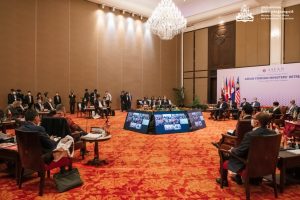Myanmar’s military junta has flatly rejected the request of an Association of Southeast Asian Nations (ASEAN) envoy to meet with representatives of the opposition shadow government, pointing to its own designation of the latter as a “terrorist” organization.
At last week’s ASEAN Foreign Ministers’ Retreat, Cambodian Foreign Minister Prak Sokhonn, the bloc’s current special envoy to Myanmar, said that he planned to visit the country next month to meet with top junta officials. With Malaysia’s backing, Sokhonn said he was also seeking permission to meet with representatives of the National Unity Government (NUG), many of whom are members of the civilian administration that the military overthrew in February of last year.
In response to the ASEAN foreign ministers’ meeting, from which Myanmar’s military administration was excluded due to its foot-dragging on the implementation of ASEAN’s Five-Point Consensus peace plan, the junta’s Foreign Ministry issued a statement late yesterday evening. The statement asserted that it would “promote constructive cooperation with ASEAN, including with the special envoy.” But this was heavily caveated by the declaration that it would stop short of allowing the envoy to engage with “unlawful associations and terrorist groups” that were “perpetrating violence.”
In May, the military declared that the NUG and the Committee Representing Pyidaungsu Hluttaw, a group of elected parliamentarians that appointed it, to be “terrorist organizations,” and has since used all of the coercive tools at its disposal to eradicate their resistance to military rule. The effort has now cost the lives of at least 1,560 people, and mired the country in a violent struggle with no apparent end.
For the envoy to engage with these resistance groups, the Foreign Ministry statement asserted, would be “contrary to the principles of the ASEAN charter but also undermines ASEAN’s counterterrorism efforts.” The statement concluded by urging “the two members [presumably, Cambodia and Malaysia] not to use ASEAN platforms to make such comments” and encouraging them instead to “condemn the terrorist acts” carried out by these forces.
Earlier this month, Cambodian officials said that the junta would permit Sokhonn to meet with members of the ousted civilian government on a future trip to the country. But as I noted at the time, there were always good reasons to believe that any access would be highly conditional and stop short of involving anyone with meaningful role in the resistance. Indeed, it is likely that the junta will only be willing to grant access to a handful of what it terms “moderate” NLD officials, while proscribing any contact with the “hardliners” populating the NUG and allied organizations.
The fact that the junta is promising “constructive cooperation” while blocking the ASEAN envoy from meeting with the NUG – a request that is consistent with both the letter and spirit of the Five-Point Consensus – tells us quite clearly what it thinks about ASEAN’s proposed peace plan. Indeed, when Cambodia announced that the junta would only be able to send a “non-political” representative to the ASEAN Foreign Ministers’ Retreat, it condemned the decision and declined to take part at all.
Both of these actions show, if any addition evidence were needed, just how little concern the military junta has for the opinion of its ASEAN peers. It also suggests that the exclusion of the Tatmadaw from political participation in ASEAN, and possible greater isolation from its Southeast Asian neighbors, are prices that it is willing to pay to ensure the consolidation of its hold on power.

































